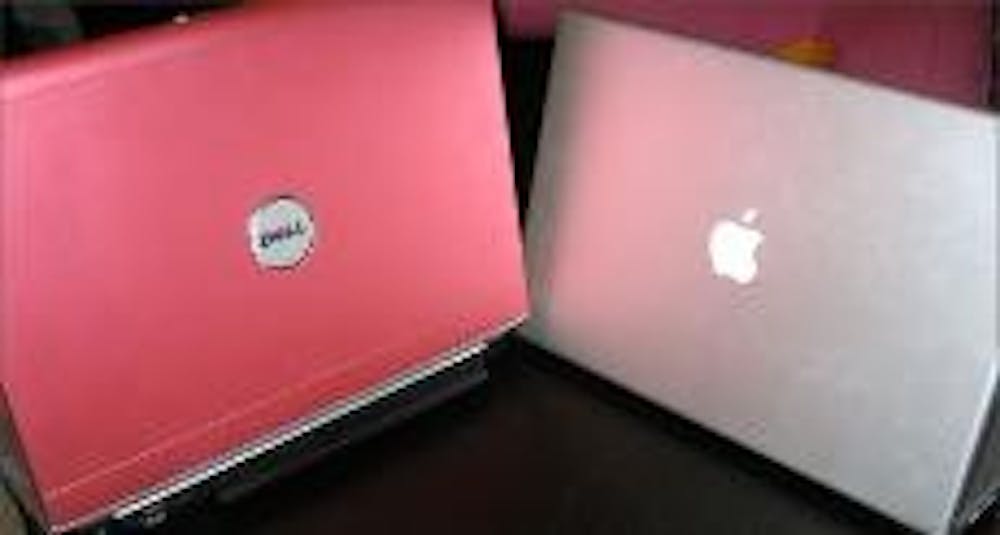
Sixty-three percent of first-year students that participated in the Miami Notebook program this year chose Macs, like the MacBook Pro, seen right, instead of the PC option, like the Inspiron 1420 from Dell, seen left. The program currently offers students a choice between Macintosh and Hewlett-Packard computers.
More students buying laptops through the Miami Notebook program chose Macs over PCs this year, according to Debi Allison, interim vice president for information technology.
Of the 72 percent of the first-year class that purchased a Miami Notebook, Allison said 63 percent chose a Mac.
Robert Howard, senior director for support services and partnerships, said Apple's marketing has created a halo effect and he's not surprised students have become more interested in buying Macs.
"If you watch TV, we all love the 'I'm a Mac, I'm a PC' ad," Howard said. "And you can't walk across the street without seeing the white earbuds."
Howard said Macs have been effective for college students.
"There is really good integration of the multimedia aspects of peoples lives, like podcasting and sharing pictures," Howard said about Macs.
On the other hand, students that have purchased an HP laptop through the Miami Notebook Program are equally happy.
Junior Lindsay Nicoletti has always used PCs.
"It's similar to what I have at home," Nicoletti said of her HP laptop. "I was used to it. I've never had a Mac so I don't know the difference, but I feel like (a PC) is easier to navigate."
Junior Lauren Regueyra recently switched from a PC to a Mac and is very happy with her decision.
Enjoy what you're reading?
Signup for our newsletter
"I like the way that they're organized better," Regueyra said. "Once you learn how to use them, they're much easier to use than a PC."
Regueyra said she likes how easy Macs are to transport as well.
"(Macs) weigh a lot less than most laptops do and I wanted to be able to take it with me most places," Regueyra said.
She also said that she'd had her previous laptop, a PC, for two years, and it was already slowing down and having other issues.
According to Allison, Macs cost $400 to $500 more than the PCs-an HP laptop-offered in the Miami Notebook program.
Howard said although many students do not mind the higher price for the Mac, many students purchase the less expensive PC laptops.
"We don't want things to be too expensive because we want to provide access to all income levels of students," Howard said.
The increase in the purchase of Macs has had an impact on IT support as well.
"We want to make sure that Mac users have access to the same services as PC users," Howard said. "We're heavily engaged in making sure there aren't problems for Mac users. In the past, we worked more to fix PCs, and now it could be more Macs."
Howard said this process does not involve hiring more support staff, but rather training more staff on Macs.
"There are challenges because sometimes with the software we have, there is a difference in how it works on a Mac," Howard said. "We have to allocate staff time to keep up with different technologies."
Howard added that when it comes to the Miami Notebook program, Miami wants parents to have peace of mind that their (childrens') computers will work on campus, and that the support is there if they need it.
"If the computer doesn't work, they have a place to rely on to provide that service," Howard said. "We're trying to make sure we can stand behind that regardless."
Nicoletti chose to purchase through the notebook program because service was readily available if something happened to her computer.
"Miami makes it pretty convenient," Nicoletti said. "If something happens to my laptop I can just deal with it here."
When it comes to using computers on campus, students have not been happy with Cisco Clean Access Agent, the required authentication program for Miami's network.
"Right now, we're having from 60 seconds to four minutes to get on the network," Howard said. "We're looking for a way to make it more streamlined and to make it where it's not such a speed bump on the way to getting connected."
Although this is an inconvenience for students, Howard said it is necessary to have a program like this in place to protect everyone in the network.
"Cisco Clean Access is probably one of the top five calls we get," Howard said of IT Services. "But we really need something like Cisco Clean Access in place."




